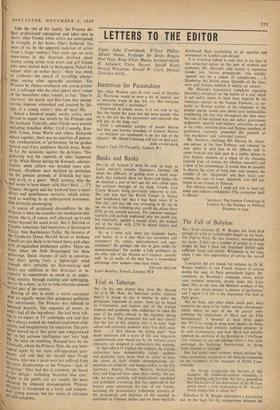The Fall of Babylon
Sta,—Your reviewer, D. W. Brogan, has been kind enough to write at considerable length on my book,' The Fall of Path. He has, however, misrepresented my views--I feet--on a number of points: or it may simply be that I have not expressed myself with sufficient force and clarity. Whichever is the case, might I take this opportunity of setting the record right?
I certainly did not intend, for instance (as D. W. Brogan implies), to rate French chances of success during the siege of Paris particularly highly. Mr.' comments on Bourbaki's campaign alone, which your reviewer mentions, should make this fairly clear. Nor, in my view, did Moltke's conduct of the war by any means present 'a picture of perfection,' and I regret it if this is the impression The Fall of Paris gives.
But lot these, and other minor cavils pass; what concerns me most is his rather serious misrepresen- tation where he says of me 'he greatly over- estimates the importance of Marx and the Firit International.' I devoted at least three pages (pp. 291-3) to trying to stress how, despite its name, the Commune had virtually nothing whatever to do with Communism. and how Marx had actually opposed -the outbreak of the Revolution. I challenge your reviewer to cite one passage where I may have portrayed the bickering International as 'going from triumph to triumph' One last point: your reviewer makes perhapS his most astonishing statement of all when h0,0 ec0o0 corn
comments
on my treatment of the massacre of 2 munards:
Mr. Horne exaggerates the horrors of this slaughter. By nineteenth-century standards,. it was startling and horrible, but for a generation that has known of the destruction of the Warsaw ghetto surely a little moderation in Mr. Horne's moral indignation is called for?
Elsewhere D. W. Brogan administers a patronising pat on the back for my comparisons between the
siege of Paris in 1870 and Leningrad in 1941-4— where one-third of the population died. Does D. W. Brogan really mean that twentieth-century historians should no longer express 'indignation' on anything less than a first-class massacre, i.e. of the order of a million and a half people as at Leningrad, instead of a mere 20,000? I find this in particular an ex- traordinary sentiment to read in the columns of a supposedly liberal and humanitarian journal, noted in the past for its own unmoderated 'moral indigna- tion' at the deaths of a paltry few thousand Egyp- tians at Suez, a handful of Africans at Hola Deten- tion Camp; not to mention the execution of a mere brace or two of murderers.
I wonder if your reviewer also considers the hideous story currently devolving on the Yorkshire moors not worthy of 'indignation' because only two bodies have been found so far?
28 Walton Street, London, SW3
ALISTAIR HORNE







































 Previous page
Previous page